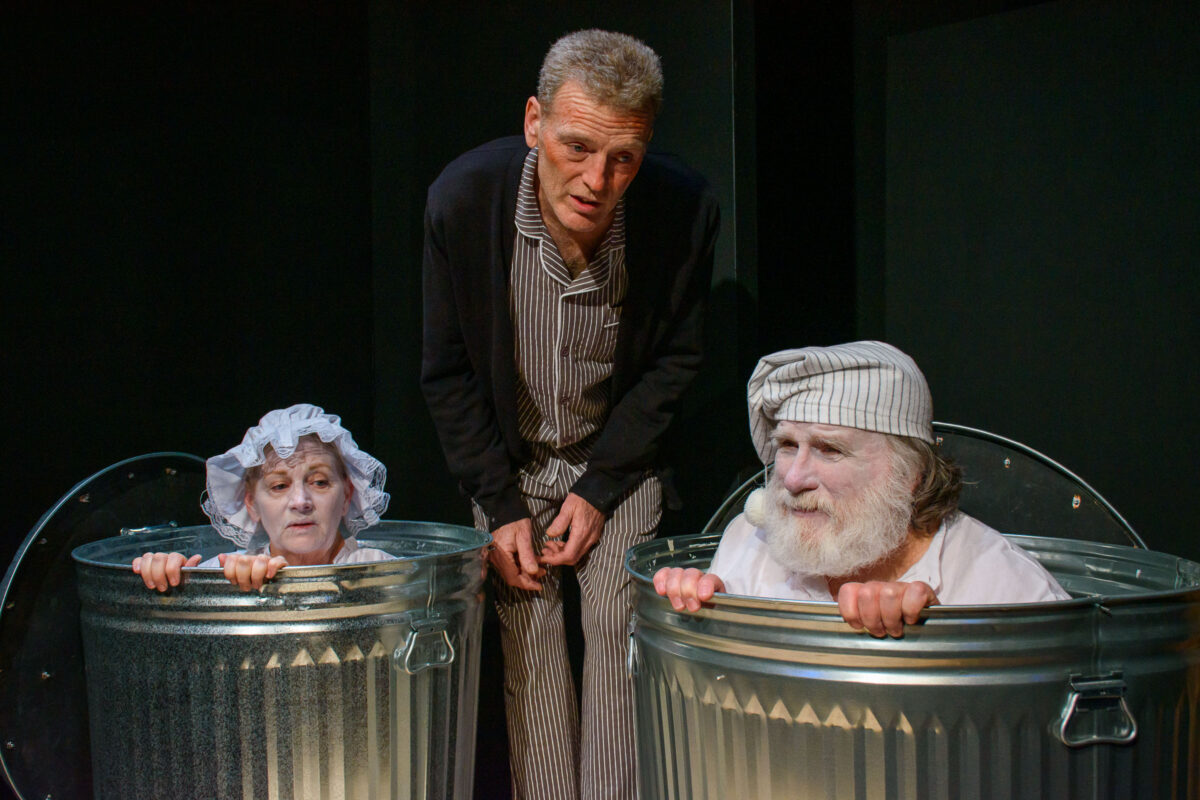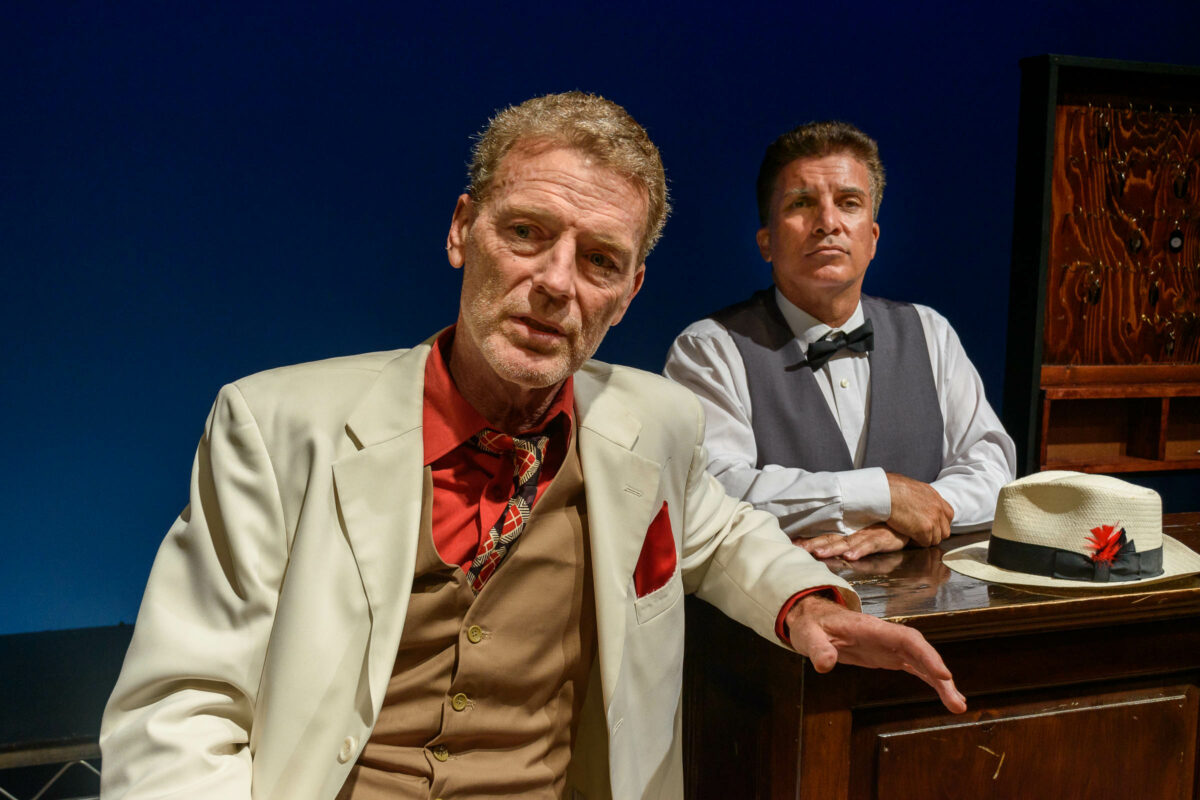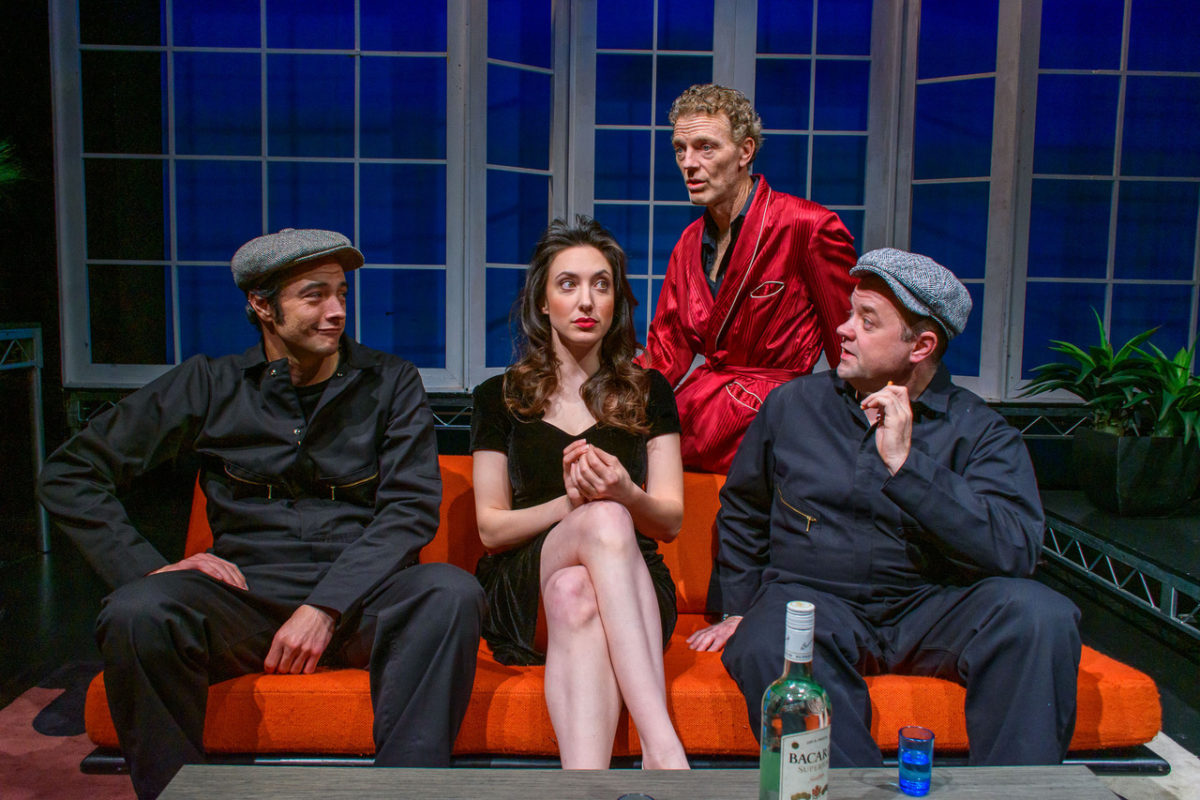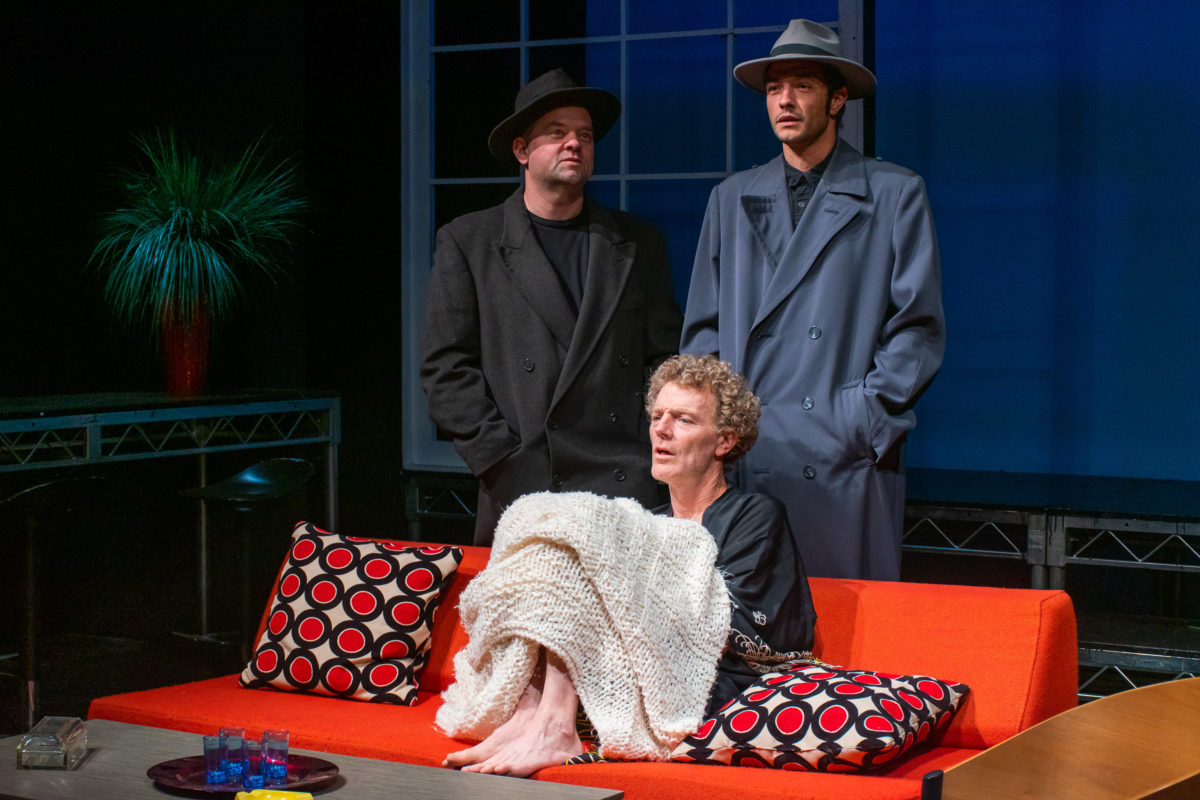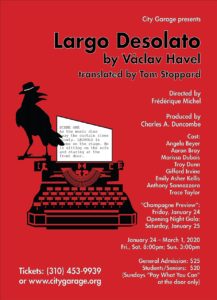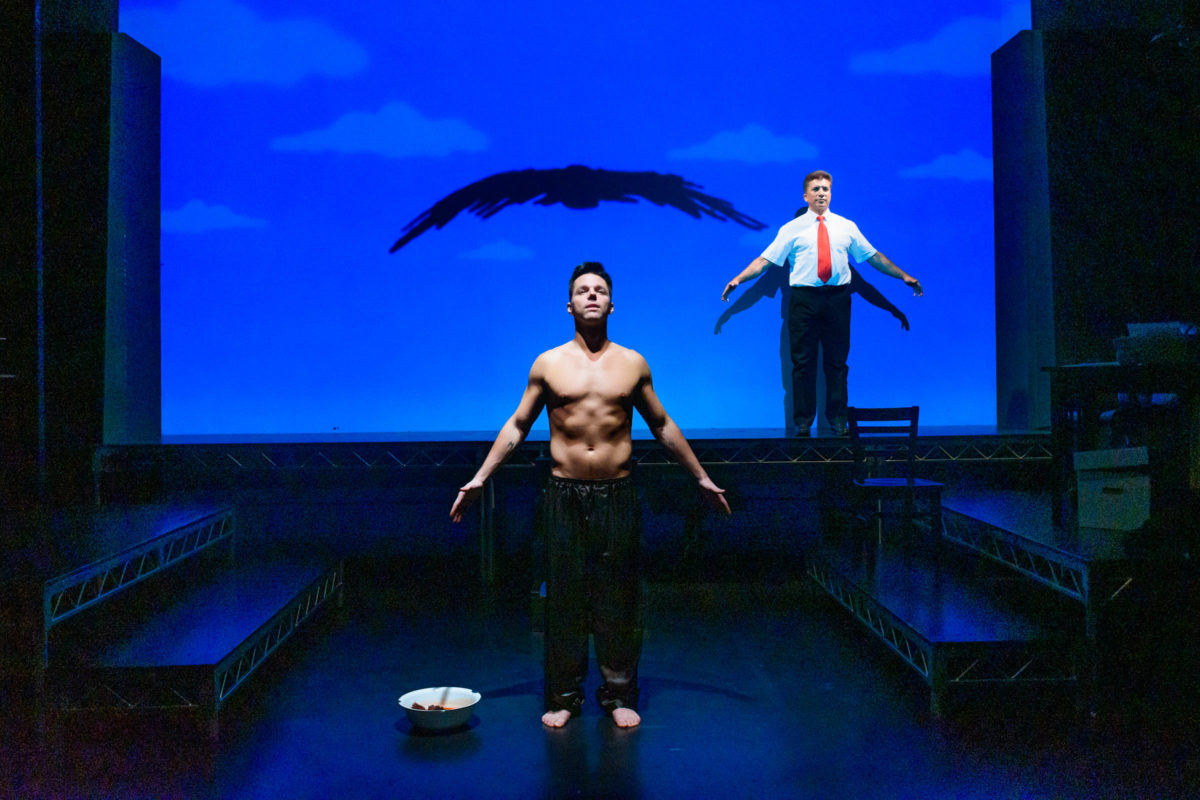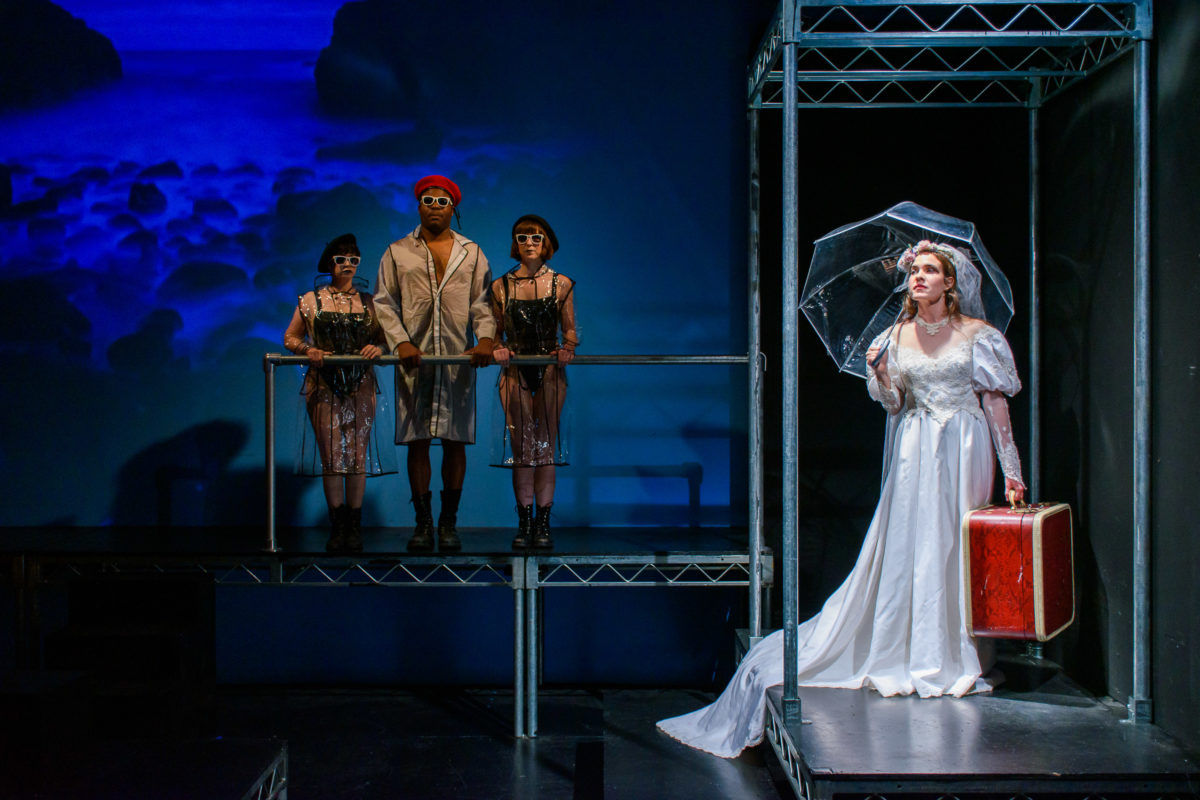Bonjour Citygaragistes,
Only two performances left of “The Birthday Party.” If you haven’t seen it yet, this is your last chance!
“My friends, I urge you to see this challenging and inspiring performance of The Birthday Party by Harold Pinter. Superb acting and stage directing in an intimate space with only a few dozen seats. You can still buy tickets for this performance for the month of July. I hope you take the time to enjoy it.”
–Edward Goldman, Art Matters
“This production knocked it out of the park.”
–Night Tinted Glasses
“The Birthday Party is open for a lot of interpretations for its real meanings. Even if one doesn’t win in this guessing game, the stage presentation at City Garage makes great theater as viewed on its intimate stage.”
–Accessibility Live Onstage
Top Ten, Recommended!
The Birthday Party was not intended to be a realistic depiction of everyday life among working class Brits; instead, it was meant to relay awareness of the dark oppressive forces that lie beneath the surface of daily living….Much of the humor and pure entertainment in this production is reflected around Flood’s utterly engaging persona, a beacon amidst the baleful shadows and apocalyptic themes…an adept, well-paced production…a tale of authoritarianism run amuck.”
–Deborah Klugman, Stage Raw
“City Garage has revisited The Birthday Party in a splendid production that captures Pinter’s specialty as a playwright: grotesque naturalism wrapped around a core of menace and depravity…. superb acting and directing.”
–Will Manus, Total Theater
Make your reservations now!
Buy Tickets Now
Please note our current COVID protocols.
And merci to our many donors who have added more candles to our cake.
Please join them with your donation of $100 to add another candle. Can we get one for each of our last 35 years? Only twelve more to go. Here’s a link you can follow to add yours to the cake:
Coming August 5th “Beach People” by Charles A. Duncombe.
Tickets now on sale!
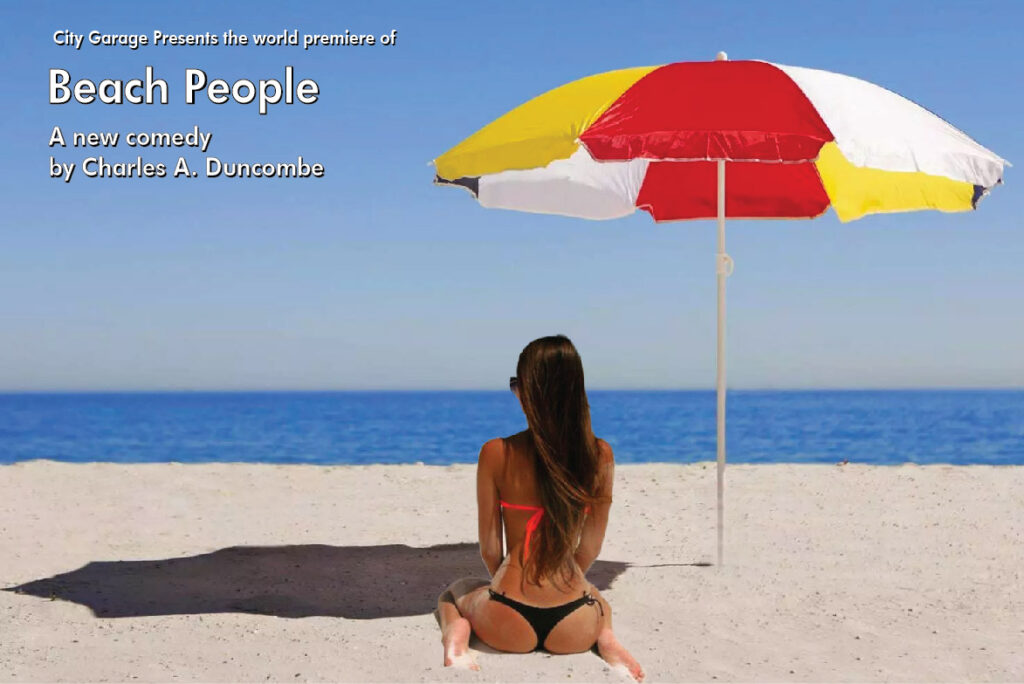
Close your eyes and listen to the sound of the waves, feel the sun on your skin, have a pina colada, smell the coconut oil. A couple baking happily on the sand seem to have found paradise until their life is turned upside down by a beautiful girl in bikini who has a thing for fruit salad and eastern philosophy. And what about the handsome waiter in a speedo? This is how a day at the beach turns into existential panic. Two floundering people struggle to figure it all out—literally—in this new comedy about love, sex, and the meaning of life by award-winning playwright Charles A. Duncombe.
https://city-garage.ticketleap.com/beach-people/
Animal Farm
This week on “Animal Farm” Steven talks with Roger Q. Mason, playwright of Lavendar Men, opening next week at Skylight Theatre/Playwrights’ Arena.
A Tribute
It is with great sadness that we share with you that this last week we lost one of our dear friends and long-time company members, the very talented, bright young woman and mother of twins, Liz Hight. Here is one of her great performances, in Eugene Ionesco’s The Lesson. She will be missed by her family and friends.
Watch The Lesson
Merci, and see you soon at City Garage
Love,
Frederique 👠👠

“Voices From Ukraine” – The Worldwide Ukrainian Play Readings Project
To support humanitarian aid for Ukraine, please visit our page, “Voices From Ukraine.”
Voices from Ukraine

As part of the Worldwide Ukrainian Play Readings Project, a global effort to raise humanitarian aide for the people of Ukraine, more than a hundred theatre companies around the world have presented over 170 readings of 22 plays by Ukrainian playwrights, all of them written since the war began. Here is the reading City Garage presented on May 15th. If you want to support this cause, here are links to some charities on the ground in Ukraine.
Ukrainian Emergency Performing Arts Fund (https://www.uepaf.org.ua/)
Children’s stories (https://voices.org.ua/en/childrens-stories/)
Humanitarian aid for Ukraine (https://www.lphr.org/en/humanitaere-hilfe-ukraine/)
Here’s the video of the reading:
Thanks again to the donors who supported the reading:
Chopper Bernet, Nathan Birnbaum, Holly and Harold Dunnigan, Anne Guillen, Lisa and Bill Gray, Jana Hatch, Garv Manocha, Roger Marheine, Graciela Markarian, Myron Meisel, Bottara Kahn Nabaie, Veronique Pascal, Sirpa Raitanen, Laurel Schmidt, Pamela St. Clair-Johnson, Michael Toman, Gustav Vintas.
“Endgame” by Samuel Beckett
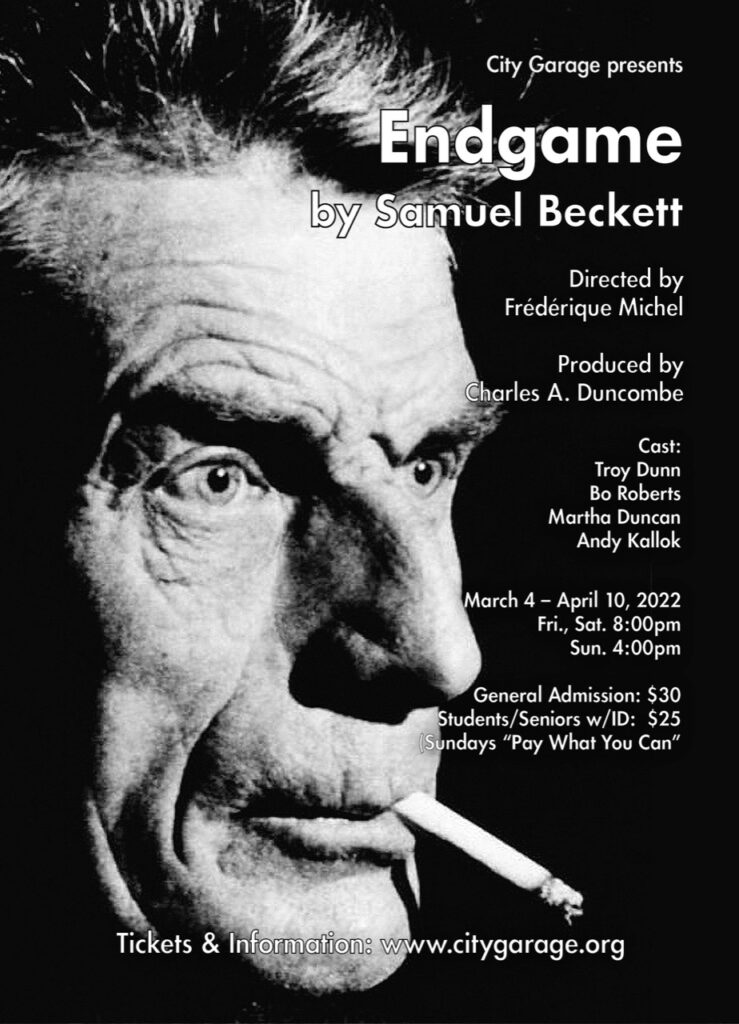
Bonjour Citygaragistes,
It’s the last weekend for Samuel Beckett’s “Endgame!” Don’t miss a chance to see this wonderful and haunting show. Make your reservations today!
“Top Ten” – Recommended! Stage Raw
“Nothing is funnier than unhappiness.” This line from Samuel Beckett’s grim yet witty one-act, a classic of the existentialist “Theatre of the Absurd” canon, may best sum up the playwright’s bleak philosophy. Laughter at those less happy than us – at least for now – may be our only solace in the face of the inevitable. What with the pandemic and Putin, what better way to spend an evening?….Director Frédérique Michel has a knack for comic timing, exemplified with Clov’s business with sundry props and the characters’ flippant comments, some of which Beckett uses to teasingly suggest that his characters are in on the bizarre gag. And the ensemble is well matched for its depiction of a dysfunctional family – and world – on its last – whether missing, useless, or damaged – legs.”
“How We Buried Stalin” – Russian dissident playwright Artur Solomonov on “Animal Farm”
Also, this week on a special episode of “Animal Farm,” Steven talks with Russian playwright Artur Solomonov who’s controversial play “How We Buried Josef Stalin” was dropped by the Moscow theater that commissioned it under the pressure of Putin’s regime. Steven has an extended conversation with the playwright about the nightmares taking place in both Ukraine and Russia and how Solomonov’s play explores the recent revival of Stalin worship in Russia and what that might portend. Please watch.
Animal Farm

Refugee Support for Ukraine
In 2000 we did a production about human rights abuses in Chechnya called “Atrocities.” Tragically, the same thing is now playing out all over again before the world’s horrified eyes. We thought we would offer the production online for the next few weeks, as well as the text. Please show your support of the millions of displaced citizens of Ukraine by giving directly to UNICEF, Amnesty International, or the charity of your choice. Here are links:
UNICEF USA Official Site – Help Children in Ukraine
Watch the City Garage Classic production “Atrocities”
Purchases of the text made through our website will be forwarded to the charity of your choice. Just give us instructions at citygarage@citygarage.org.
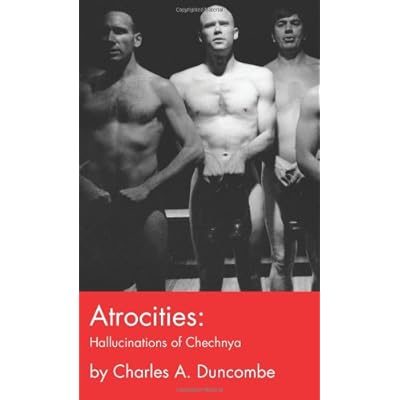
Atrocities: Hallucinations of Chechnya by Charles A. Duncombe
Purchase the book from Amazon
Merci, and we look forward to seeing you at City Garage.
Love,
Frederique
“Hughie” by Eugene O’Neill
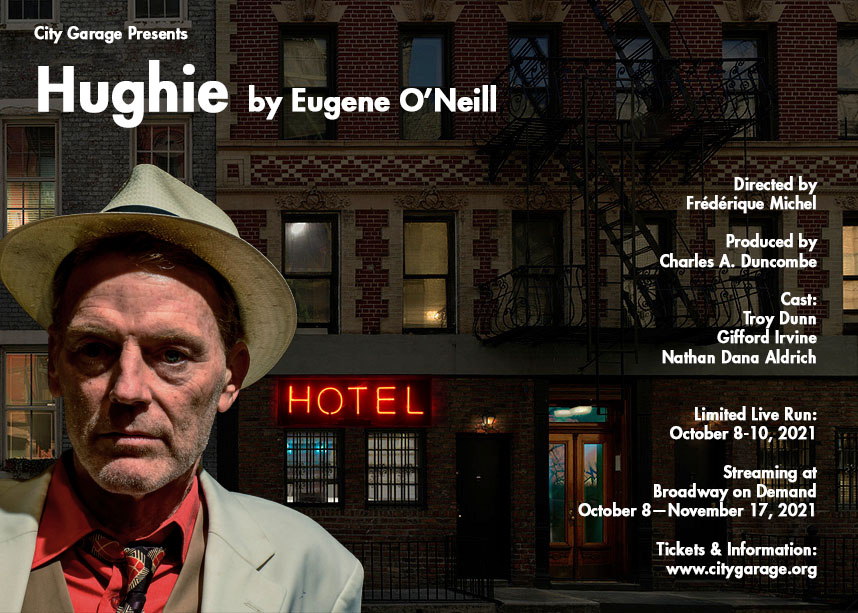
Bonjour Citygaragistes,
It’s opening weekend at last at City Garage! Eugene O’Neill’s late masterpiece, “Hughie” It’s been long time coming and we’re so grateful that so many of you have shown us so much support during this extended shutdown. But we finally resume live, in-person performance this weekend and we hope to have many of you with us for these three special, limited-seating performances: Friday and Saturday at 8:00pm, and Sunday at 4:00pm–October 8th, 9th and 10th. Proof of vaccination and masks will be required. There are still some seats available, so if you’d like to attend in person please write to us at citygarage@citygarage.org. Let us know which night you’d like to come, and how many seats. We will send you a confirmation along with a link to Paypal for payment in advance. Tickets are $30.
If you’d like a little taste of the show, here is a trailer on YouTube.
And this weekend we start our new partnership with the nationwide streaming service, Broadway on Demand. “Hughie” opens nationally on the same night as it does here in Santa Monica, Friday, October 8th and it will run through November 14th. Once it opens you can stream it any time you like during those dates. Tickets are $15 and they’re available now. Here is the link:
And of course there is a new episode of our weekly talk show about theater and politics with Steven Leigh Morris, “Animal Farm.” This week Steven talks to Marc Antonio Pritchett, Co-Artistic Director of Sacred Fools, one of LA’s most dynamic theater companies.
Be a Patreon! Your support means so much and can start as low as just $2 a month! Help keep us going!
Here’s the link to our Patreon Page.
Stay safe, get vaccinated, and we look forward to seeing you for “Hughie”—either through streaming or at City Garage!
Love,
Frederique
The Ann Bronston Story Project
Bonjour Citygaragistes,
This weekend on the City Garage YouTube channel, we’re happy to present “The Ann Bronston Story Project,” a selection of stories written by company member Ann Bronston and performed by Troy Dunn, Lindsay Plake, and Martha Duncan. They are stories of love, loss, sex, and family that unravel the secret longings and conflicts that can both torment and transform us. I hope you will check them out. And on our web series “Animal Farm: Conversations on Theater and Politics with Steven Leigh Morris and Guests,” Steven talks with Gary Grossman, Artistic Director of the Skylight Theater about the continuing lobbying efforts to pass California Senate Bill 805 to help small nonprofits adapt to the requirements of AB5—especially LA’s alternative theaters.
Here is a link to talk show:
https://citygarage.org/animalfarm/
Correction: In last week’s episode we incorrectly identified our guest Angela J. Davis as a prosecutor for the LA County Superior Court. Our apologies. She was formerly a Federal Prosecutor for the Central District of California, and is now serving as a Commissioner for the LA County Superior Court’s Family Division.
And here is a link to “The Ann Bronston Story Project.” It will be showing on our City Garage YouTube channel from 8:00pm this Friday, June 11th, through noon on Friday, June 18th.
https://www.youtube.com/c/citygaragetheatre

It’s free to view but we ask people to make a donation if they can through our Chuffed page or at “Support Us” on our website:
Chuffed
https://chuffed.org/project/citygarage
City Garage website
Support Us
SAVE THE DATE!
We’re also excited to announce a new project we’ve created just for streaming! Four monologues from “10 x 10” by Neil LaBute. LaBute is one of our favorite playwrights, someone who is willing to take an unflinching look at the truth of things. Not afraid to shock or offend. He pulls no punches and is always after the hard truth of what people do and why they do it. Make sure you mark next Friday, June 18th for the debut of our first original streaming project! More information to come in next week’s newsletter.
Merci,
FM
“Largo Desolato” by Vaclav Havel
Largo Desolato
by Vaclav Havel
January 24 – March 1, 2020
“The Consulate General of the Czech Republic highly recommends the Václav Havel’s semi-autobiographical play Largo Desolato… at the City Garage Theatre.” —
Invitation posted on Consulate Cultural News & Events page
“An eerie, atmospheric staging at City Garage in Santa Monica revisits Havel’s absurdist 1986 portrait of Iron Curtain paranoia…The material is well suited to the stylish City Garage aesthetic, as director Frédérique Michel and designer Charles A. Duncombe lean into Havel’s extensive use of repetition to evoke a visceral sense of Leopold’s paralysis…. in an authoritarian state, the only thing worse than being a perceived threat is to become irrelevant.” — By Philip Brandes, LA Times
“As ever, City Garage surprises and haunts. Every cast member of Largo Desolato is a veteran of the company now, and deliver performances with power as well as precision. The direction continues to use the (seemingly) simple presence of being in the same room with another human being to vast effect. The result feels raw, and terribly honest.” — Zahir Blue, Night Tinted Glasses
City Garage stages a timely revival of Havel’s classic piece about totalitarian regimes, censorship, and the price of integrity. In this semi-autobiographical play, translated by Czech-born playwright Tom Stoppard, a dissident intellectual, Leopold Nettles, is dogged by the secret police, pressured by his friends, and nagged by his housemate to just shut up and go along. Shadowy figures arrive to offer him a deal to stay out of prison but Nettles can’t get himself to accept. His world starts to dissolve in a hallucinatory battle of conscience but will he ultimately have the courage of his convictions?
Havel wrote the play when he had just emerged from prison in 1984. He went on to play a major role in the Velvet Revolution that toppled communism in Eastern Europe, as well as serving as the first President of the Czech Republic. What would he make of the frightening resurgence of so many of the ideas he sacrificed so much to eradicate?
Fourth Sunday Q&A
After the Sunday, February 16 matinee, please join us for an informal discussion with the director, producer, and cast of Largo Desolato.
This project is supported by the California Arts Council; LA County Supervisors through the LA County Arts Commission; the City of Santa Monica and the Santa Monica Arts Commission

“Department of Dreams” by Jeton Neziraj
“Department of Dreams” by Jeton Neziraj
Translated by Alexandra Channer
October 25 – December 8, 2019
Fridays, Saturdays 8:00pm: Sundays 3:00pm
Critic’s Choice! — Los Angeles Times
The world premiere of Kosovar playwright Jeton Neziraj’s nightmarish, Orwellian comedy of an autocratic government that demands its citizens deposit their dreams in a central, bureaucratic depository so that it can exert the fullest possible control of their imaginations. In this vast, underground complex, civil servants like Dan, a new hire for the prized job of Interpreter, sift patiently through the nation’s dreams looking for threats to the government’s authority and its version of “truth.” If order is to be maintained, deviance must be extinguished and imagination co-opted. Dan works hard and tries stubbornly to survive in this strange dream world but finds nothing is as it seems to be except the authority that rules it. Don’t miss the world premiere of this new play from one of Europe’s most remarkable playwrights.
“Theatre should side with the victims” feature on Jeton Neziraj — Stage | The Guardian
“The premiere represents a coup for City Garage’s founders, artistic director Frédérique Michel and producing director Charles A. Duncombe, whose company has been presenting edgy theater for more than 30 years. Michel, who also directs, and Duncombe, whose typically stunning production design is a highlight, do full service to Neziraj’s savagely topical, darkly funny piece.” — F. Kathleen Foley, Los Angeles Times
Read Stage Raw’s interview with Jeton Neziraj: Kosovo’s Molière: Mocking Hypocrites and Autocrats
“The cast entire does the fine job I frankly have come to expect from City Garage, with Frederique Michel’s direction showing wonderful insight…” — David MacDowell Blue, Night Tinted Glasses
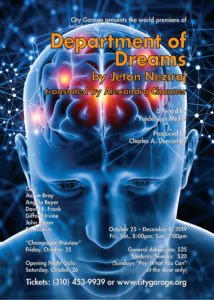
Special Events: Weekend of November 8 – 10th, 2019
City Garage is thrilled to announce that playwright Jeton Neziraj will be traveling from Kosovo to join us for a weekend of special events around this world premiere. Support City Garage and help us meet our goal of $25,000 for this fall by being part of this exciting weekend. Tickets for all events are $50 each. Or pick a performance of your choice, then attend as many of the after-show events as you like—up to all three—for $100. Book your tickets through this link:
Friday, 11/8: Champagne Reception and Book Signing: Meet the author, mingle with cast and crew, and have your script signed (copies of “Department of Dreams” available at $25).
Saturday, 11/9: Catered Reception: Join us for dinner after the show, along with the playwright and other special guests of honor.
Sunday, 11/10: Panel* Discussion: Steven Leigh Morris, editor of Stage Raw, will moderate a discussion on “Theatre and Politics.” How can—or should—theatre address the urgent political realities of its moment? The particular focus is on the rise of autocracies in Europe, the Balkans, and the west in general, and the role of the arts in contemporary politics. Q&A with the playwright and panelists to follow.
*Panelists: Steven Leigh Morris, Moderator, Editor Stage Raw; Dr. Mietek Boduszynski, Assistant Professor of Politics at Pomona College; Viktorija Lejko-Lacan, Department of Slavic East-European and Eurasian Languages and Cultures UCLA; Lauren Murphy Yeoman, Assistant Professor of Theatre, USC School of Dramatic Arts.
Limited Seating! Get your tickets now!
“Eurydice” by Sarah Ruhl
“Macbett” by Ionesco
There will be a reading of “Macbett” by Ionesco on Sunday, August 25 at 6:00pm.
Directed by Ann Bronston. Free.
“Eurydice” by Sarah Ruhl
Champagne Preview August 9
Opening Saturday August 10
Pulitzer-prize nominee Sarah Ruhl stands the Orpheus myth on its head and retells it from Eurydice’s point of view. Comic, tragic, silly and poetic in turns, this inventive play follows Eurydice as she does her best to adapt to life in the underworld.
Abandoned by her self-absorbed poet-lover, she rides elevators, has long conversations with stones, defends herself against suspicious men, and finds comfort in the companionship of the ghost of her dead father, though, to his sorrow, she cannot remember who he is. She struggles to recall what it was to be alive and who she was. At last, her easily distracted lover arrives to deliver her. Or will he?
“There’s a sort of beautiful simplicity to the production which makes it feel like a story of a couple who just happen to be dealing with the underworld. Rather than epic, it feels oddly, awkwardly human. It’s a Greek myth scaled down to human proportions. Instead of an all too perfect tragic love story between an untouchable young couple, it becomes the story of a woman who has a creepy guy hit on her on her wedding day. It’s simple, it’s quiet, it’s deeply personal. While this “Eurydice” sidesteps the grand gestures what it gains is simpler story of a woman who’s facing a hostile world with a husband who’s distracted, a man who keeps harassing her, and a world filled with rules to keep her life small. City Garage’s take…lets you hear the play and taps into a vein that feels honest and a bit raw.” — Anthony Byrnes, “Opening The Curtain” KCRW
“What Ruhl does, and this wonderful cast does under the direction of Frederique Michel, is focus not upon Orpheus but what this story means from Eurydice’s point of view….Words alone by a playwright rarely haunt or move. They are meant to be acted out, and this cast captures the eerie and quietly human voyage of these characters. City Garage can and often does perform outrageously stylized works. They do these so very well. But my favorites have always been when the simple life of the characters shine through, the decisions and consequences and experience of what is happening. Eurydice counts as one of my favorites from this company, because even a Stone, even a God, still seem somehow human. The humans meanwhile make me ache for them. Especially the title character, due in larger part to the actor who portrays her.” — David MacDowell Blue, Night Tinted Glasses
“Director Frederique Michel, designer Charles A. Duncombe, and videographer Anthony Sannazzaro—and of course the gifted cast—work considerable stage magic with Ruhl’s slight, whimsical, but (at times) charming play. I came away feeling glad I had seen it.” Will Manus, Total Theatre
“Eurydice is a whimsical, often thoughtful exploration of memory as life and loss of memory as death. There’s much more than a tragic love story here. Ruhl’s combination of Becket and Alice in Wonderland leaves a stream of thoughts trickling through your brain long after the flood of images has subsided.”
-Oakland Tribune
Fourth Weekend Q&A: Informal discussion with the cast, crew and director Sunday, September 1st, after the 3:00pm performance.
This project is supported, in part, by the Los Angeles County Supervisors through the Los Angeles County Arts Commission, the California Arts Council, and by the City of Santa Monica and the Santa Monica Arts Commission.
“War in the Times of Love” by Jeton Neziraj
New Play Reading
War in the Times of Love
by Jeton Neziraj
Sunday, May 19 @ 7:00pm
“Pay-what-you-can”
Directed by Ann Bronson
City Garage is excited to begin introducing its audience to the work of one of Europe’s most important new playwrights, Jeton Neziraj.
This play, set in an imaginary beauty parlor—within an insane asylum—is the scene of mesmerizing confessions, as four “odd” women evade the traumas of their past by escaping to a shared imaginary world in which they take refuge as in a dream. Neziraj creates a disturbing and cathartic play, blending the mundane and the fantastic, to wrestle with the break-up of the former Yugoslavia.
Neziraj, author of more than twenty-five plays that have been performed all over the world, was voted “European of the Year” in 2018” for his promotion of progressive ideas and values, and has been called “the Kafka of the Balkans.”
Join us for this special reading, the first in a series of readings of new plays this year, and an introduction to our production of Neziraj’s newest work “Department of Dreams” coming to City Garage this fall.
Please let us know you’re coming! Call 310-453-9939 or email citygargage@citygarage.org to RSVP (not required, but much appreciated).
“Exit the King” by Eugène Ionesco
“Exit the King” by Eugène Ionesco
Translated by Frederique Michel &
Charles Duncombe
Champagne Preview May 31
Opening Saturday June 1
A deluded king. A failing kingdom. Two squabbling queens vying for his attention. An obsequious doctor. A dim-witted but loyal guard and a mouthy servant.
In Eugene Ionesco’s darkly comic masterpiece we witness the final hours of megalomaniac King Berenger the First. His monstrous ego has kept him alive for four centuries, but now, Queen Marguerite calmly informs him, the time has come to die. Berenger fights tooth and nail. He rages, pleads, denies, bargains, supported by the lovely and loyal Queen Marie. But Queen Marguerite, coolly efficient, aided by her henchman, the doctor, draws the king relentlessly closer to his final moment on earth.
At once broadly comic and deeply unsettling, the play alternates between Monty Python-style slapstick and haunting echoes of Shakespearean tragedy. In this, the most Beckett-like of all Ionesco’s work, we follow an existential journey into the most terrifying landscape of all: our own mortality.
In a new translation by City Garage founders Frederique Michel and Charles Duncombe.
“Why this? A once powerful, now collapsing civilization in the grip of a deranged megalomaniac? Obviously, it’s a scenario so implausible today, so far beyond the imaginative capacity of contemporary American audiences that we must treat it as a historical curiosity rather than, say, an urgent and eerily relevant warning.” — Read Margaret Gray’s “essential” listing in the Los Angeles Times
“Such a wild emotional roller coaster works, even amid the absurd details … because the cast under the direction of Frederique Michel breathes vivid life into what might easily have come across as utter chaos. Every detail makes sense.” — Read Zahir Blue’s full review at Night Tinted Glasses
“City Garage impressively pulls off a metaphysical play without any special effects other than Michel’s staging. Her direction is simple yet stylized, with a sprinkling of heightened movement and gesture. And while Exit the King’s technical design is minimal throughout the show, its final image is arresting and haunting thanks to Duncombe’s lighting.” — Read Taylor Kass’s full review at Stage Raw
“The final scene between the resonant Dunn and cool, elegant, swan-necked Natasha St. Clair Johnson … is one of those theatrical moments that … leave[s] audiences holding their collective breath before a well-deserved exhale and wild applause.” — Read Ravi Narasimhan’s full review at Backscatter.
“Their new translation (and adaptation) is crisp and colloquial, easy on the ear. And they have mounted the play in equally vibrant fashion… As performed with heart-breaking power by Troy Dunn, The King is vain, confused, self-centered, yet all too human and likable…” —Will Manus’s full review atTotal Theater












